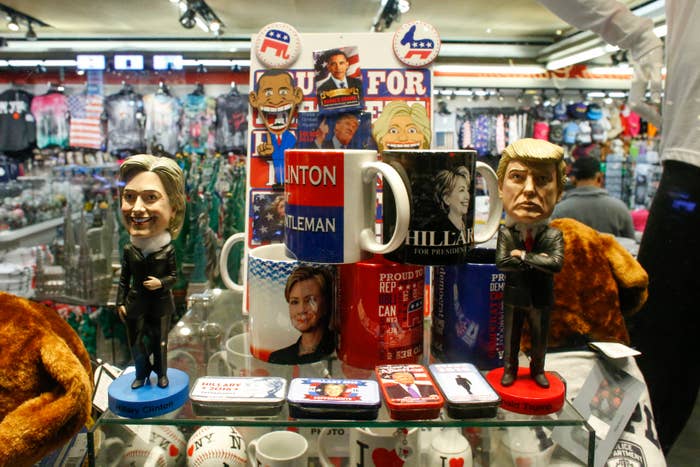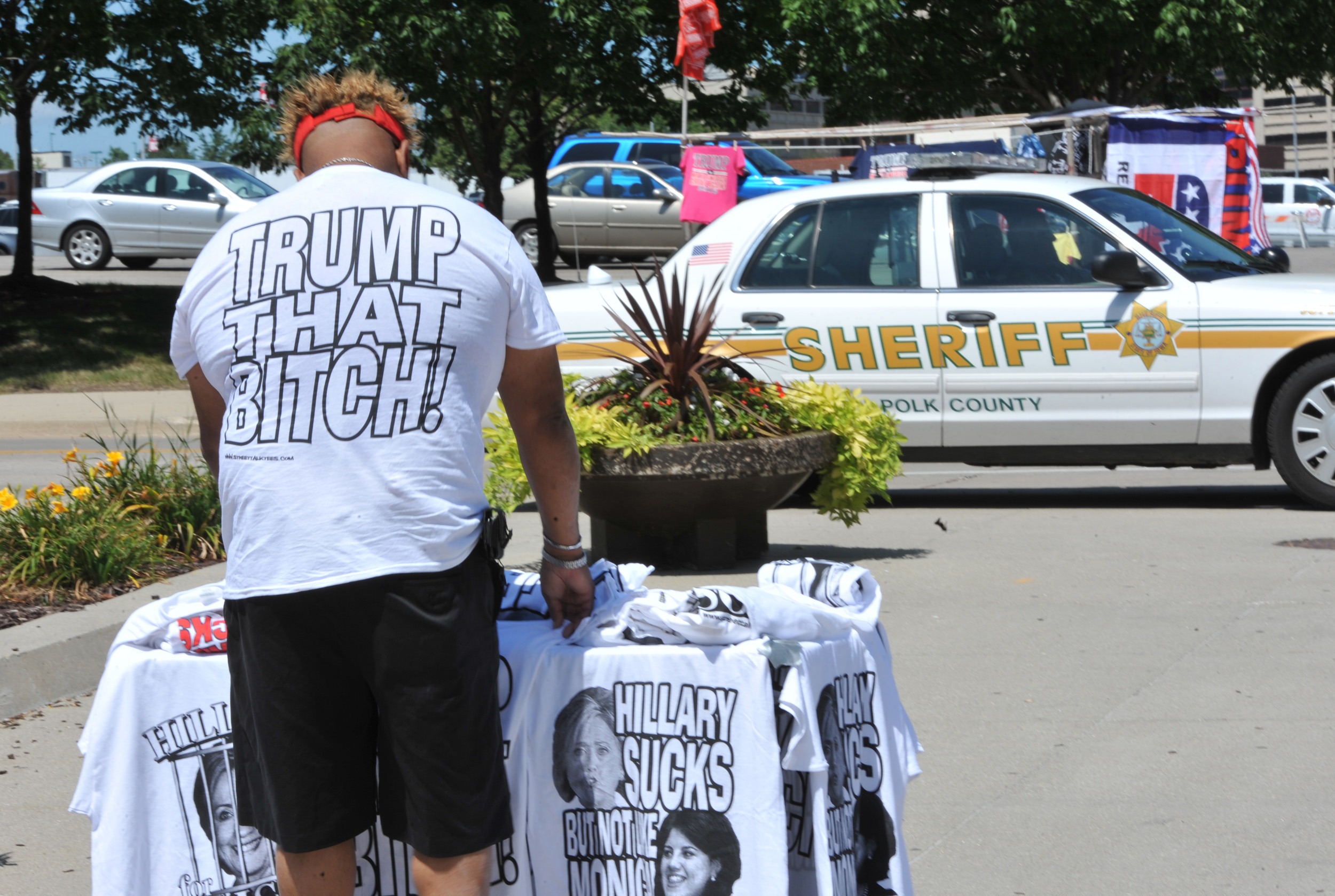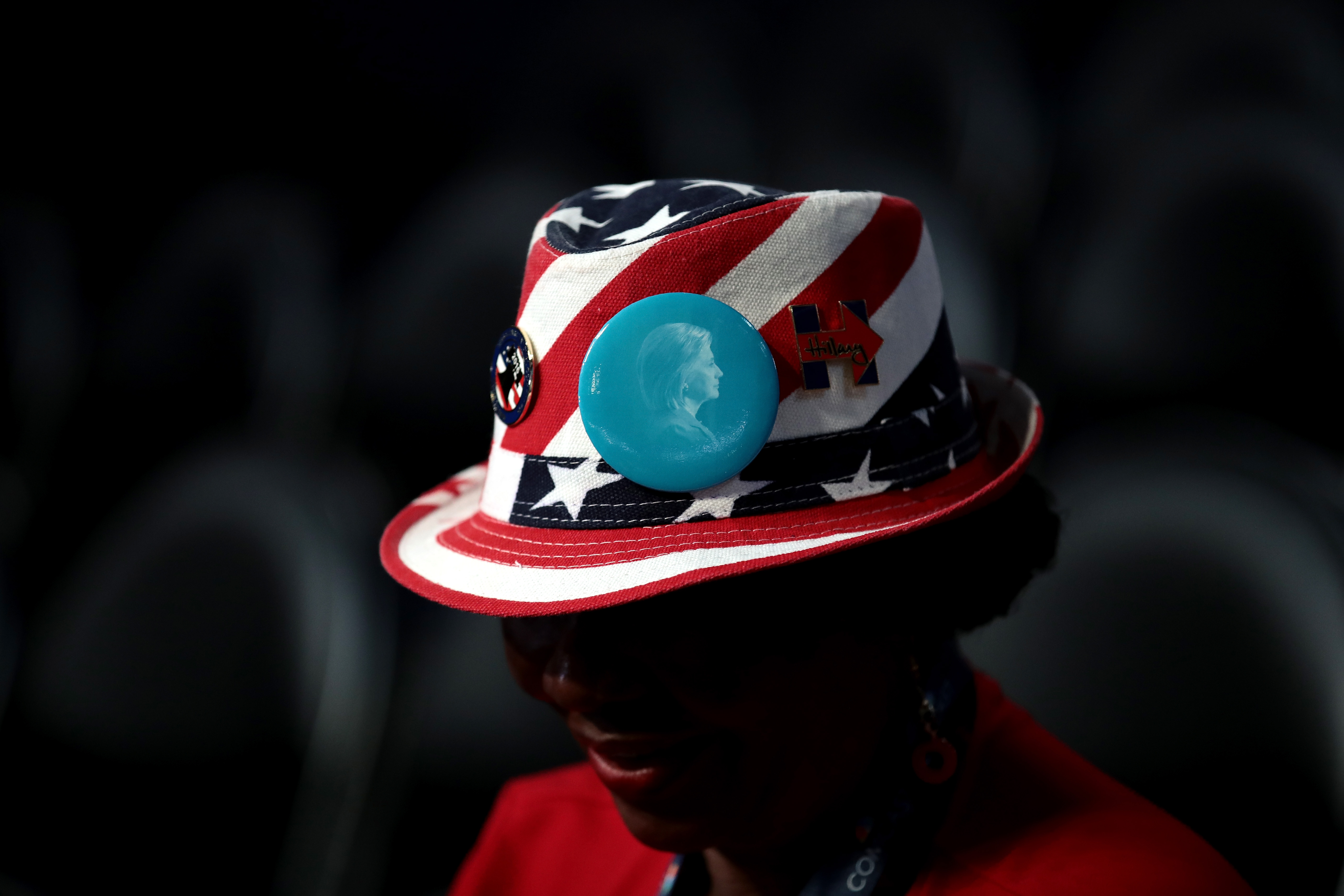
When Hillary Clinton categorized half of Trump supporters as belonging to “the basket of deplorables” at a private fundraiser on Sept. 9, a new political tagline was born. So was a new merchandise line.
The following week, the five top-selling designs on CafePress, a popular marketplace for sales of political merchandise, were all related to the comment, according to a company spokesperson, as sellers rushed to produce t-shirts, stickers, and underwear that shouted phrases like “Proud to be a Deplorable” and “Deplorables for Trump.” Countless items utilizing the phrase also popped up on other online sales platforms like Zazzle, Etsy, and Amazon.
“Fits well...A timely fashion!!” one reviewer wrote of his slate-colored, size 3XL “DEPLORABLES LIVES MATTER” shirt, listed for $19.99 on Amazon. “Trump trump trump,” added another reviewer.
“You’re talking about a billion-dollar industry. No question about it.”
Official political merchandise—all the hats, T-shirts, buttons, water bottles, bumper stickers, playing cards, and throw pillows (among dozens of other items) sold by campaigns—is a huge business. The revenue from the sales counts as campaign donations, and while campaigns aren’t required to disclose how much they actually rake in from the items, all of this year’s major presidential candidates have used them to add millions to their war chests. (As of May, Donald Trump’s campaign, which also later incorporated “Deplorables” items, had grossed more than $6 million from the sales, while Bernie Sanders’ had taken in nearly $13 million, campaign officials told Reuters. Hillary Clinton’s campaign didn’t disclose figures.)
But unofficial political merchandise, the items sold by unaffiliated entrepreneurs and shops, is a different animal: All over the country, via brick-and-mortar stores, street vendors and, mostly, online platforms, people are selling and buying their own versions of Make America Great Again trucker hats, Hillary For President T-shirts, even “Live Free” Gary Johnson kitchen aprons (100 percent cotton, $23.99 on CafePress.) Because of the nature of these kinds of sales, where anyone with a printer and some hustle can start doing business, experts say it’s impossible to measure just how big the unofficial campaign merch market actually is. But it’s undeniably, as Trump would say, huge.
“You’re talking about a billion-dollar industry,” says Marshal Cohen, a retail expert with the NDP group. “No question about it.”

“Everything from salt shakers to cookies...is some kind of political opportunity.”
To some degree, the tradition of American political merchandise is almost as old as the tradition of American political campaigns. Andrew Jackson, running against Quincy Adams in a highly contentious 1828 race, included as part of his campaign merchandise a medallion depicting the candidate in military regalia atop a horse (to emphasize his credentials as a war hero, of course); by the 20th century, cheaper printing made campaign buttons ubiquitous, a piece of merch perhaps most famously employed by “I Like Ike” Eisenhower supporters in 1952.
But it’s really just in the past three election cycles or so, Cohen says, that political merchandising has really exploded, with consumers eager to buy not only conventional items like buttons and T-shirts but practically anything imaginable. “It’s become a national phenomenon,” he says. “Everything from salt shakers to cookies...is some kind of political opportunity.”
Generally speaking, presidential candidates are eager for their merch to be sold because it amounts to free advertising, Cohen explains. “As a candidate, I want people to see other people embracing and feeling passionate about my candidacy.” If you’re leaning Johnson, in other words, but are hesitant to actually vote for him because you don’t think anybody else will, enough of those “Feel the Johnson” T-shirts might actually translate into votes.

But this year’s candidates haven’t always been thrilled by unofficial merch sales. Last October CBS MoneyWatch reported that the Sanders campaign was annoyed by unlicensed “Feel the Bern” swag, with a spokesman adding that the products couldn’t be guaranteed as union-made, as official items are. The Trump campaign sent a cease and desist letter to CafePress over the website makeamericagreatagain.com, which CafePress had been using to redirect to its site (it no longer does, and the website now appears with a message saying the domain name is for sale). A lawyer for the Carson campaign also sent a cease and desist to the company over Carson swag, alleging trademark violations.
“Why do we care?” Doug Watts, a spokesman for the Carson campaign, told US News. “Because these people, and others, leverage our campaign and image to line their pockets, and often imply that the proceeds are used to support the campaign.”
A lawyer representing CafePress dismissed the claims as baseless, arguing that none of the items flagged by Carson’s campaign actually violated the campaign’s specific logo. “You cannot use trademark theories to ride roughshod over members of the American public,” Paul Levy, the attorney, wrote in a response to Carson’s lawyer. Levy added that such sellers are simply expressing political views and are therefore protected by the First Amendment.
Not that a few trademark threats could slow down the unofficial merch machine.
On Amazon, more than 90,000 items show up from an “Election 2016” search; on Zazzle, 99,812 Trump-related items (both pro and anti) appear for sale, along with 92,158 Clinton-related items. On the latter site, shirts, bumper stickers, and buttons are the top-selling political pieces, a spokesperson tells Complex, although a prospective buyer could also choose from between 380 different Trump air fresheners, six Hillary floor mats, and 35 Jill Stein beer steins. (Get it?)
Cohen, the retail expert, says that people often buy political merch simply to show off their loyalty, the same way fans buy New York Mets or Los Angeles Lakers gear. But they also might wear a “Hillary for Prison” shirt or a “Trump Sucks” hat to start conversations or attract attention. One Amazon reviewer, declaring himself a Hispanic Trump supporter, exclaimed about the looks he got while wearing a “Make America Great Again” shirt inside a Latino grocery store; another Trump fan was hoping the shirt would “piss off the liberals on campus!”
Many sellers also see the merch sales as a way to support their candidate. Krista Madden, a Cincinnati resident who sells Hillary t-shirts and mugs as part of her printing business, tells Complex she’s also a volunteer for the campaign. Kerrin Serna, a Clinton supporter who designs prayer candles in Southern California, sells a positive Saint Hillary candle, featuring a beatific image, and an unflattering “Make America Hate Again” Trump version.
“You can’t vote yet,” she says, “but you can buy a candle and send your good prayers out there for Hillary.”

Other merch sellers, though, are less partial. One representative of a brand based in Tennessee that sells pro-Trump political apparel declined to comment to Complex, saying he “didn’t want to politicize it.” Back in July, outside the Republican National Convention in Cleveland, a Trump apparel seller disclosed to NPR that he was actually a Bernie supporter:“Here’s the deal,” Al Jones said. “When you go to Wal-Mart or you go to Target, they don’t ask you your political beliefs. They just take your money...I’m doing the same thing.”
On the whole it’s not clear whose supporters are actually buying more swag, although CafePress has an Election Barometer that keeps track of merchandise sold by candidate, complete with a red and blue electoral map. According to the barometer, Trump merch is narrowly winning, including in swing states Ohio, Florida, and Pennsylvania, although Clinton merch has sold better in recent weeks.
“When you go to Wal-Mart or you go to Target, they don’t ask you your political beliefs. They just take your money...I’m doing the same thing.”
She’s done well on other sites, too, especially after this year’s biggest election bombshell led to another new merch line: In the days following the release of the infamous Trump Tape, in which the candidate crudely bragged about grabbing women by the genitals without their consent, “Pussies Against Trump” T-shirts and buttons, featuring innocent cartoon drawings of cats, were among the top overall sellers on Zazzle.
And they weren’t the first animal-related election items to appear for sale. Last year, Annie Grossman, who owns a dog training business in Manhattan, was trying to come up with a more creative spin on a common pet item—dog poop bags—when she naturally thought of the election. The bags would make an ideal canvas for one particular candidate’s face, she thought, so Grossman convinced her father, renowned illustrator Robert Grossman, to come up with a design: a cartoonish portrait of Donald Trump, wearing a dour expression.
After several American manufacturers refused to produce the bags, Annie turned to China. In January she placed an order for 5,000, which has nearly sold out. “Oh my god, people love them!” she tells Complex.
The metaphor intended by the bags, Grossman added, is straightforward: “It’s saying, ‘This guy is more deserving of having his face in a pile of poop than he is of the presidency.’”

